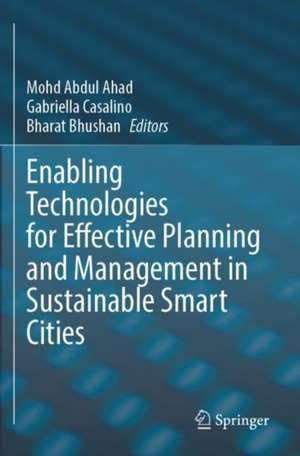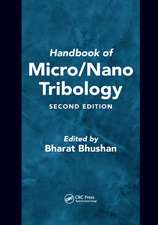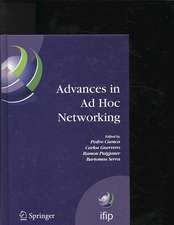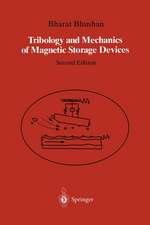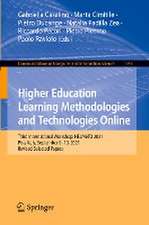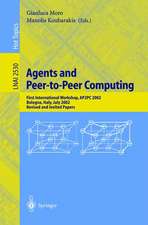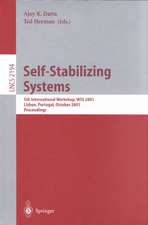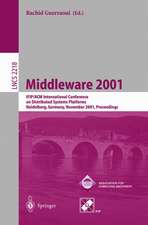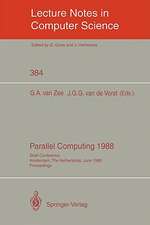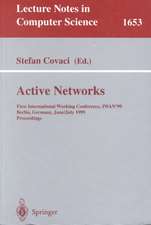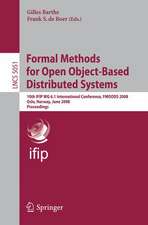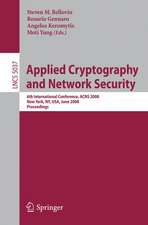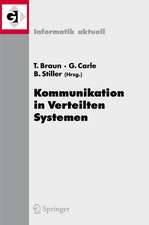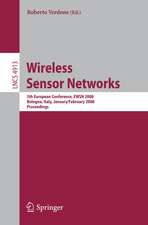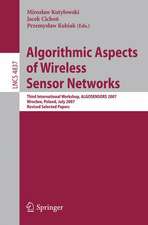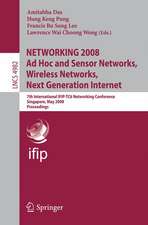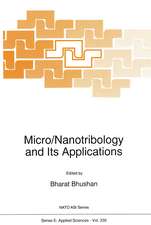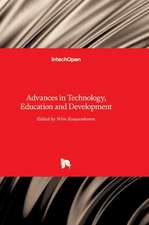Enabling Technologies for Effective Planning and Management in Sustainable Smart Cities
Editat de Mohd Abdul Ahad, Gabriella Casalino, Bharat Bhushanen Limba Engleză Paperback – 3 mar 2024
Typically, in smart cities data is sensed by the sensor devices and provided to end users for further use. The sensitive data is transferredwith the help of internet creating higher chances for the adversaries to breach the data. Considering the privacy and security as the area of prime focus, this book covers the most prominent security vulnerabilities associated with varied application areas like healthcare, manufacturing, transportation, education and agriculture etc. Furthermore, the massive amount of data being generated through ubiquitous sensors placed across the smart cities needs to be handled in an effective, efficient, secured and privacy preserved manner. Since a typical smart city ecosystem is data driven, it is imperative to manage this data in an optimal manner. Enabling technologies like Internet of Things (IoT), Natural Language Processing (NLP), Blockchain Technology, Deep Learning, Machine Learning, Computer vision, Big Data Analytics, Next Generation Networks and Software Defined Networks (SDN) provide exemplary benefits if they are integrated in the classical city ecosystem in an effective manner.
The application of Artificial Intelligence (AI) is expanding across many domains in the smart city, such as infrastructure, transportation, environmental protection, power and energy, privacy and security, governance, data management, healthcare, and more. AI has the potential to improve human health, prosperity, and happiness by reducing our reliance on manual labor and accelerating our progress in the sciences and technologies. NLP is an extensive domain of AI and is used in collaboration with machine learning and deep learning algorithms for clinical informatics and data processing. In modern smart cities, blockchain provides a complete framework that controls the city operations and ensures that they are managed as effectively as possible. Besides having an impact on our daily lives, it also facilitates many areas of city management.
| Toate formatele și edițiile | Preț | Express |
|---|---|---|
| Paperback (1) | 999.81 lei 38-44 zile | |
| Springer International Publishing – 3 mar 2024 | 999.81 lei 38-44 zile | |
| Hardback (1) | 1170.12 lei 6-8 săpt. | |
| Springer International Publishing – 2 mar 2023 | 1170.12 lei 6-8 săpt. |
Preț: 999.81 lei
Preț vechi: 1249.76 lei
-20% Nou
Puncte Express: 1500
Preț estimativ în valută:
191.37€ • 207.94$ • 160.86£
191.37€ • 207.94$ • 160.86£
Carte tipărită la comandă
Livrare economică 17-23 aprilie
Preluare comenzi: 021 569.72.76
Specificații
ISBN-13: 9783031229244
ISBN-10: 303122924X
Pagini: 402
Ilustrații: XIV, 402 p. 136 illus., 96 illus. in color.
Dimensiuni: 155 x 235 mm
Ediția:2023
Editura: Springer International Publishing
Colecția Springer
Locul publicării:Cham, Switzerland
ISBN-10: 303122924X
Pagini: 402
Ilustrații: XIV, 402 p. 136 illus., 96 illus. in color.
Dimensiuni: 155 x 235 mm
Ediția:2023
Editura: Springer International Publishing
Colecția Springer
Locul publicării:Cham, Switzerland
Cuprins
1. Challenges and Opportunities in Secure Smart Cities for Enhancing the Security and Privacy.- 2. Reliability and Security of Edge Computing Devices for Smart Cities.- 3. Artificial Intelligence in Smart City- Systematic Literature review of Current Knowledge and Future Research Avenues.- 4. Predictive Farmland Optimization and Crop Monitoring using Artificial Intelligence Techniques.- 5. Natural Language Processing (NLP) based Innovations for Smart Healthcare Applications in Healthcare 4.0.- 6. Evolving of Smart Banking with NLP and Deep Learning.- 7. Blockchain based Smart Card for Smart City.- 8. Blockchain-powered Smart E-healthcare System: Benefits, Use cases, and Future Research Directions.- 9. A Comprehensive Review of Wireless Medical Biosensor Networks in Connected Healthcare Applications.- 10. Smart Intelligent System for Cervix Cancer Image Classification using Google Cloud Platform.- 11. IoT and An Intelligent Cloud-Based Framework to Build a Smart City Traffic Management System.- 12. Emersion and Immersion of Technology in the development of smart cities: A bibliometric Analysis.- 13. Examining social media, citizen engagement and risk communication: A smart city perspective.- 14. 5G and 6G Technologies for Smart City.- 15. Software defined virtual clustering based content distribution mechanism in VNDN.- 16. Sustainable Energy Usage in Urban and Rural Context-A Study.
Notă biografică
Dr. Mohd Abdul Ahad is currently working in the Department of Computer Science and Engineering, School of Engineering Sciences and Technology, Jamia Hamdard, New Delhi, India. He has a rich experience of more than 14 years in the field of Computer Science and Engineering. He obtained his Ph.D. degree in the field of Big Data Architecture. His research areas include big data architecture, Distributed Computing, IoT, Sustainable Computing. He has published several research papers in various International Journals of repute in Q1 and Q2 categories. His cumulative Impact factor for the last three years is 49.8 (As per Clarivate/JCR). He has chaired several sessions in International Conferences of Springer, Elsevier etc. He is a Certified Microsoft Innovative Educator and a certified Google Educator. He is a life member of Indian Society of Technical Education (ISTE) as well as an active Senior Member of IEEE. Apart from that he is also on the review board of several prestigious journals like Journal of Networks and Computer Applications, Elsevier, Sustainable Cities and Society, Elsevier, Journal of Ambient Intelligence and Humanized Computing (JAIHC), Springer, Computers in Biology, Elsevier etc.
Dr. Gabriella Casalino is currently Assistant Professor at the CILab laboratory of the department of Informatics, University of Bari, working on machine learning techniques applied to Web Economy domain. This position has been funded by the Italian Ministry of Education, University and Research (MIUR) through the European funding project AIM (Attraction and International Mobility). Her research interests span in the field of Data Analysis. Her works cover different domains such as Text mining, Hyperspectral Imaging, eHealth, bioinformatic, anomaly detection, Educational Data Mining. She is currently woking on stream data mining algorithms. Gabriella Casalino has got the Ph.D. in Computer Science at the Doctoral School in Computer Science ofthe Department of Informatics, at University of Bari "A. Moro". She defended the thesis "Non-negative factorization methods for extracting semantically relevant features in Intelligent Data Analysis". She was awarded by the Italian Ministry of Education, University and Research (M.I.U.R.) with a grant covering the three-year period of her Ph.D. In 2008 she got a B.Sc. in Computer Science from the University of Bari, and in 2011 she got a M.Sc. in Computer Science from the same University.
Dr. Bharat Bhushan is an Assistant Professor of Department of Computer Science and Engineering (CSE) at School of Engineering and Technology, Sharda University, Greater Noida, India. He received his Undergraduate Degree (B-Tech in Computer Science and Engineering) with Distinction in 2012, received his Postgraduate Degree (M-Tech in Information Security) with Distinction in 2015 and Doctorate Degree (PhD Computer Science and Engineering) in 2021 from Birla Institute of Technology, Mesra, India. In the year 2021, Stanford University (USA) listed Dr. Bharat Bhushan in the top 2% scientists list. He earned numerous international certifications such as CCNA, MCTS, MCITP, RHCE and CCNP. He has published more than 150 research papers in various renowned International Conferences and SCI indexed journals including Journal of Network and Computer Applications (Elsevier), Wireless Networks (Springer), Wireless Personal Communications (Springer), Sustainable Cities and Society (Elsevier) and Emerging Transactions on Telecommunications (Wiley). He has contributed with more than 30 book chapters in various books and has edited 20 books from the most famed publishers like Elsevier, Springer, Wiley, IOP Press, IGI Global, and CRC Press. He has served as Keynote Speaker (resource person) in numerous reputed faculty development programs and international conferences held in different countries including India, Iraq, Morocco, China, Belgium and Bangladesh. He has served as a Reviewer/Editorial Board Member for several reputed international journals. In the past, he worked as an assistant professor at HMR Institute of Technology and Management, New Delhi and Network Engineer in HCL Infosystems Ltd., Noida. In addition to being the senior member of IEEE, he is also a member of numerous renowned bodies including IAENG, CSTA, SCIEI, IAE and UACEE.
Dr. Gabriella Casalino is currently Assistant Professor at the CILab laboratory of the department of Informatics, University of Bari, working on machine learning techniques applied to Web Economy domain. This position has been funded by the Italian Ministry of Education, University and Research (MIUR) through the European funding project AIM (Attraction and International Mobility). Her research interests span in the field of Data Analysis. Her works cover different domains such as Text mining, Hyperspectral Imaging, eHealth, bioinformatic, anomaly detection, Educational Data Mining. She is currently woking on stream data mining algorithms. Gabriella Casalino has got the Ph.D. in Computer Science at the Doctoral School in Computer Science ofthe Department of Informatics, at University of Bari "A. Moro". She defended the thesis "Non-negative factorization methods for extracting semantically relevant features in Intelligent Data Analysis". She was awarded by the Italian Ministry of Education, University and Research (M.I.U.R.) with a grant covering the three-year period of her Ph.D. In 2008 she got a B.Sc. in Computer Science from the University of Bari, and in 2011 she got a M.Sc. in Computer Science from the same University.
Dr. Bharat Bhushan is an Assistant Professor of Department of Computer Science and Engineering (CSE) at School of Engineering and Technology, Sharda University, Greater Noida, India. He received his Undergraduate Degree (B-Tech in Computer Science and Engineering) with Distinction in 2012, received his Postgraduate Degree (M-Tech in Information Security) with Distinction in 2015 and Doctorate Degree (PhD Computer Science and Engineering) in 2021 from Birla Institute of Technology, Mesra, India. In the year 2021, Stanford University (USA) listed Dr. Bharat Bhushan in the top 2% scientists list. He earned numerous international certifications such as CCNA, MCTS, MCITP, RHCE and CCNP. He has published more than 150 research papers in various renowned International Conferences and SCI indexed journals including Journal of Network and Computer Applications (Elsevier), Wireless Networks (Springer), Wireless Personal Communications (Springer), Sustainable Cities and Society (Elsevier) and Emerging Transactions on Telecommunications (Wiley). He has contributed with more than 30 book chapters in various books and has edited 20 books from the most famed publishers like Elsevier, Springer, Wiley, IOP Press, IGI Global, and CRC Press. He has served as Keynote Speaker (resource person) in numerous reputed faculty development programs and international conferences held in different countries including India, Iraq, Morocco, China, Belgium and Bangladesh. He has served as a Reviewer/Editorial Board Member for several reputed international journals. In the past, he worked as an assistant professor at HMR Institute of Technology and Management, New Delhi and Network Engineer in HCL Infosystems Ltd., Noida. In addition to being the senior member of IEEE, he is also a member of numerous renowned bodies including IAENG, CSTA, SCIEI, IAE and UACEE.
Textul de pe ultima copertă
With the rapid penetration of technology in varied application domains, the existing cities are getting connected more seamlessly. Cities becomes smart by inducing ICT in the classical city infrastructure for its management. According to McKenzie Report, about 68% of the world population will migrate towards urban settlements in near future. This migration is largely because of the improved Quality of Life (QoL) and livelihood in urban settlements. In the light of urbanization, climate change, democratic flaws, and rising urban welfare expenditures, smart cities have emerged as an important approach for society’s future development. Smart cities have achieved enhanced QoL by giving smart information to people regarding healthcare, transportation, smart parking, smart traffic structure, smart home, smart agronomy, community security etc.
Typically, in smart cities data is sensed by the sensor devices and provided to end users for further use. The sensitive data is transferredwith the help of internet creating higher chances for the adversaries to breach the data. Considering the privacy and security as the area of prime focus, this book covers the most prominent security vulnerabilities associated with varied application areas like healthcare, manufacturing, transportation, education and agriculture etc. Furthermore, the massive amount of data being generated through ubiquitous sensors placed across the smart cities needs to be handled in an effective, efficient, secured and privacy preserved manner. Since a typical smart city ecosystem is data driven, it is imperative to manage this data in an optimal manner. Enabling technologies like Internet of Things (IoT), Natural Language Processing (NLP), Blockchain Technology, Deep Learning, Machine Learning, Computer vision, Big Data Analytics, Next Generation Networks and Software Defined Networks (SDN) provide exemplary benefits if they are integrated in the classical city ecosystem in an effective manner.
The application of Artificial Intelligence (AI) is expanding across many domains in the smart city, such as infrastructure, transportation, environmental protection, power and energy, privacy and security, governance, data management, healthcare, and more. AI has the potential to improve human health, prosperity, and happiness by reducing our reliance on manual labor and accelerating our progress in the sciences and technologies. NLP is an extensive domain of AI and is used in collaboration with machine learning and deep learning algorithms for clinical informatics and data processing. In modern smart cities, blockchain provides a complete framework that controls the city operations and ensures that they are managed as effectively as possible. Besides having an impact on our daily lives, it also facilitates many areas of city management.
Caracteristici
This book provides the basic knowledge about smart cities, its components and challenges in its effective realization This book sheds light on the know-how about the role of enabling technologies in effective management of smart cities to make them a better abode for the inhabitants The book explores various enabling technologies like Information Communication Technology (ICT), edge computing, AI, NLP, IoT, blockchain, and cloud computing
